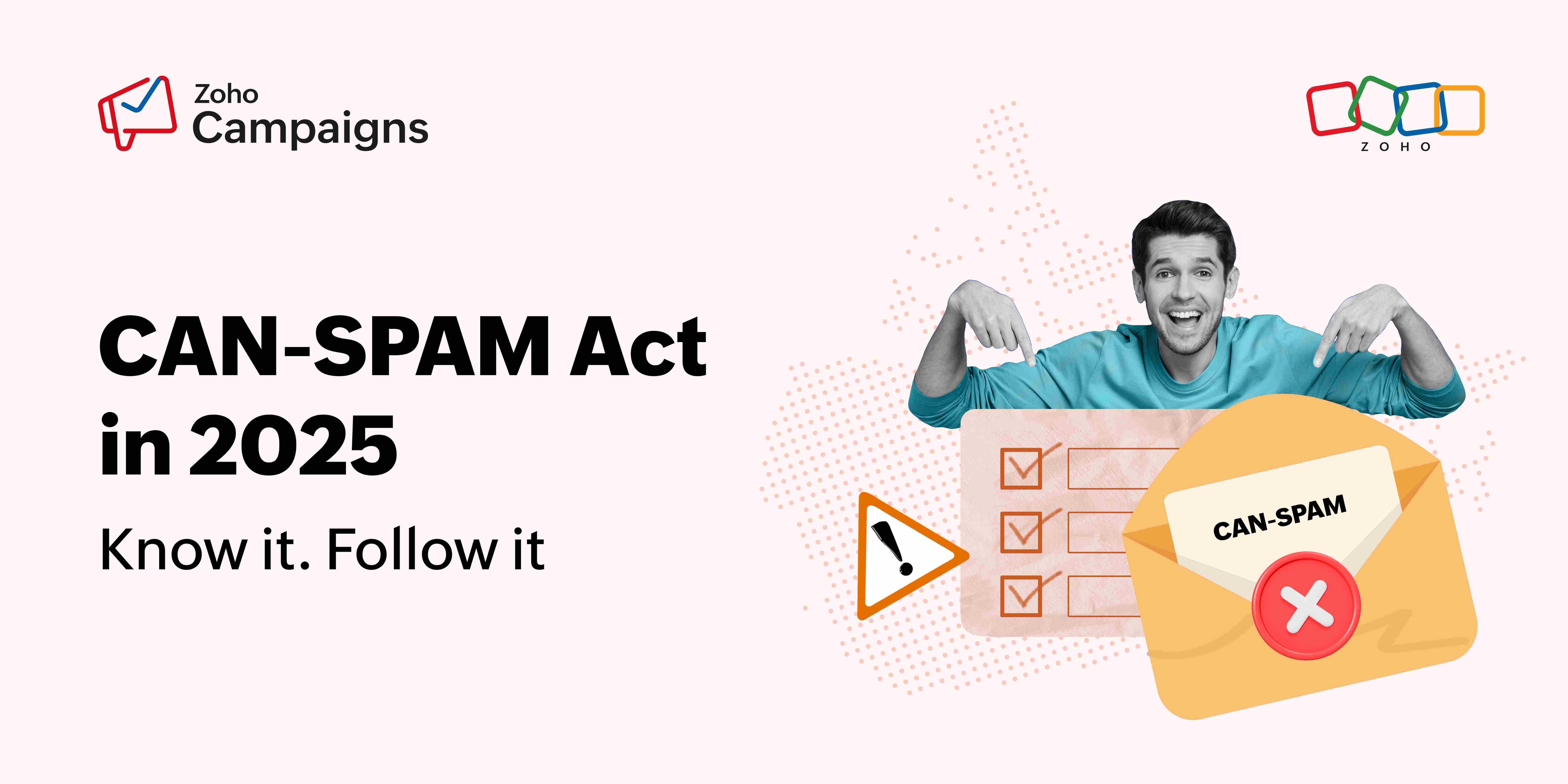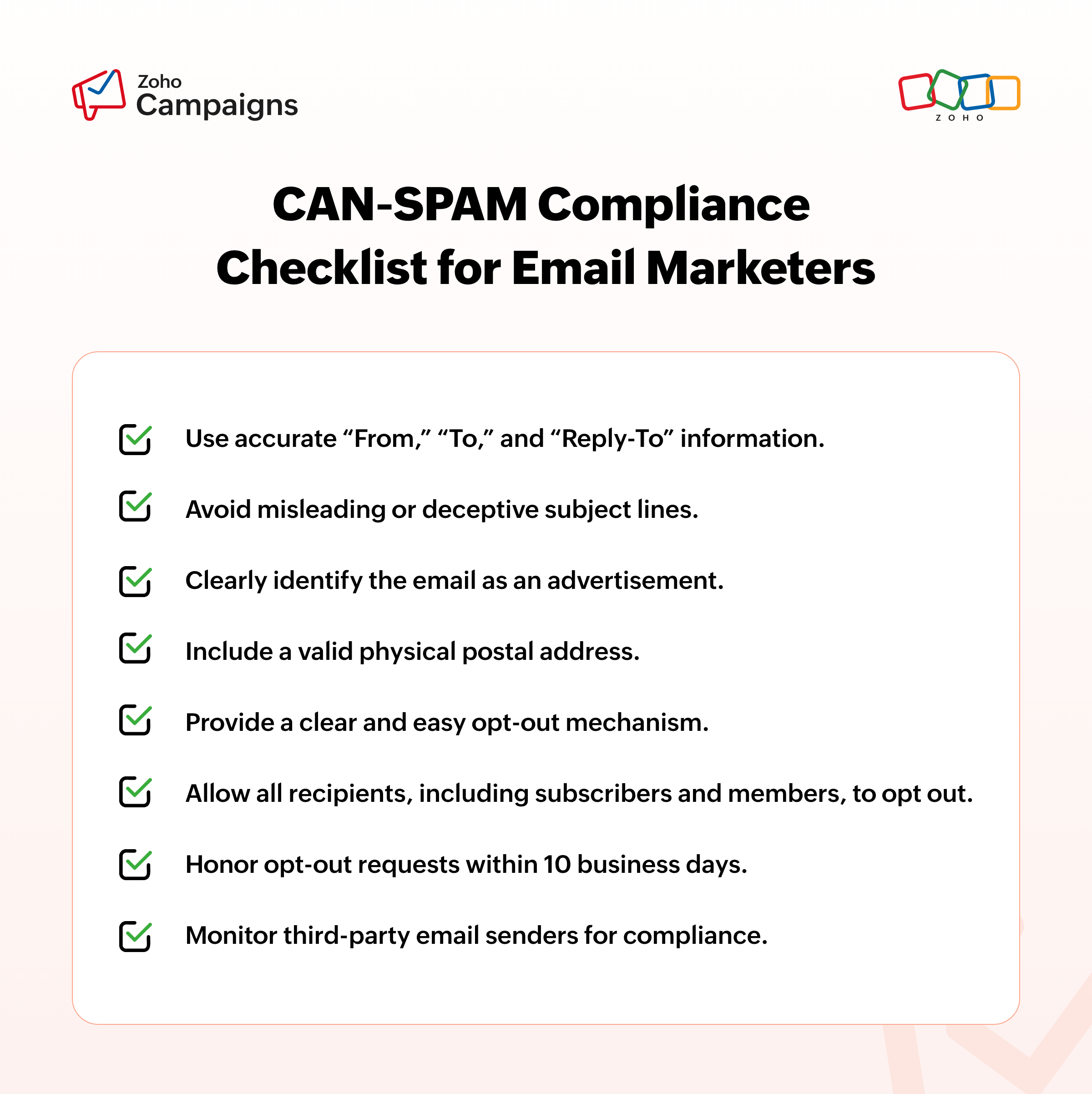- HOME
- Email Marketing
- CAN-SPAM Act compliance: A complete checklist for email marketers
CAN-SPAM Act compliance: A complete checklist for email marketers
- Last Updated : April 16, 2025
- 719 Views
- 4 Min Read

Ignorance can be expensive. $2.9 million expensive.
In August 2024, security camera firm Verkada paid the highest-ever fine for a CAN-SPAM violation, proving that email marketing mistakes can come at a hefty price.
Sounds like a marketer's nightmare, right?
That’s why understanding the CAN-SPAM Act is crucial. What does the law require? What are the penalties for violations? And most importantly, how can businesses stay compliant?
Let’s break it down and see how Zoho Campaigns can help you send emails the right way.
What's the CAN-SPAM Act?
The Controlling the Assault of Non-Solicited Pornography And Marketing (CAN-SPAM) Act of 2003 established the first national standards for sending commercial emails in the United States.
That's why any marketer who uses email as a channel for their marketing activities needs to be aware of best practices around it so they can comply with laws established in the regions where their subscribers reside.
What are the penalties for violating the CAN-SPAM Act?
Like any law, violating the CAN-SPAM Act results in penalties. As of March 2025, each non-compliant email is subject to a fine of up to $53,088.
This means that sending multiple emails in violation can lead to substantial cumulative fines.
Now, let's break down the key compliance requirements to avoid these hefty fines and protect your brand reputation.
What are the key compliance requirements under the CAN-SPAM Act?

While following this set of regulations can help you avoid hefty penalties, that’s not the only benefit!
Each of these rules is actually a fundamental best practice that every email marketer should follow. Sticking to them can help you build customer trust, increase engagement, and improve overall email performance.
So, beyond just escaping a marketing nightmare, following these regulations can do wonders for your email marketing strategy.
Sounds like a win-win, right?
Let’s dive into these must-follow regulations and how they will be beneficial to your business.
Use accurate "From," "To," and "Reply-To" information: builds customer goodwill
Your “From,” “To,” “Reply-To,” and routing details must be accurate and clearly identify who is sending the email. Transparency earns trust.
Avoid misleading or deceptive subject lines: boosts open rates
Your subject line must reflect the actual content of the email. When subscribers know they’re getting what they expect, they’re more likely to engage.
Clearly identify the email as an advertisement: enhances credibility
Make it clear that your email is an advertisement. Being upfront helps build a strong, authentic brand.
Include a valid physical postal address: strengthens brand legitimacy
Every email must include a valid physical address, making you look more reliable and trustworthy.
Provide a clear and easy opt-out mechanism: prevents spam complaints
Give recipients a simple way to unsubscribe. Making it hassle-free ensures your list stays engaged with genuinely interested subscribers.
Allow all recipients, including subscribers and members, to opt out: improves retention
Even paying subscribers or members have the right to opt out of marketing emails if the message isn’t strictly transactional. Zoho Campaigns facilitates honoring such preferences, helping you maintain a respectful and loyal subscriber base.
Honor opt-out requests within 10 business days: maintains a positive brand image
Process unsubscribe requests within 10 business days and ensure the opt-out remains functional for at least 30 days. A smooth opt-out process makes your brand look professional.

Monitor third-party email senders for compliance: protects your reputation and avoids penalties
If you hire an agency to send emails on your behalf, you’re still legally accountable for compliance. Zoho Campaigns ensures that all communications, even those sent on your behalf by third parties, adhere to the CAN-SPAM Act, safeguarding your organization from potential compliance issues.
Tip: By leveraging Zoho Campaigns' features, you can seamlessly adhere to CAN-SPAM regulations, thereby enhancing your email marketing effectiveness and fostering stronger relationships with your audience. Ready to elevate your email marketing strategy? Try Zoho Campaigns. today!
Frequently Asked Questions (FAQs) on CAN-SPAM Act compliance
Does CAN-SPAM apply to transactional emails?
No, but if a transactional email contains promotional content, CAN-SPAM rules may still apply.
Can I sell or share the email addresses of people who opted out?
No, once someone opts out, their email can't be sold, shared, or transferred, except as required by the CAN-SPAM Act.
How soon must I process unsubscribe requests?
You must honor unsubscribe requests within 10 business days. The opt-out option must stay active for at least 30 days after sending the email.
Does CAN-SPAM apply if someone opts in?
Yes, CAN-SPAM applies to all commercial emails, even if recipients opted in. The law ensures they can opt out anytime.
Does CAN-SPAM apply to social media messages?
No, it applies only to commercial emails, not social DMs.
Is it okay to use purchased email lists?
No, using purchased lists can lead to complaints and often violates CAN-SPAM rules.
How do I know if my email is considered commercial?
Any email that promotes a product or service is classified as commercial under CAN-SPAM.
How Zoho Campaigns can help with CAN-SPAM Act compliance
Navigating the intricacies of email marketing regulations can be daunting, but with Zoho Campaigns, you're well-equipped to ensure compliance and foster trust with your audience. By integrating our platform's robust features, you can seamlessly adhere to the CAN-SPAM Act's requirements, thereby enhancing your email marketing effectiveness and building stronger relationships with your subscribers.
Ready to elevate your email marketing strategy?
Stay compliant, build trust, and improve email performance.Try Zoho Campaigns.



